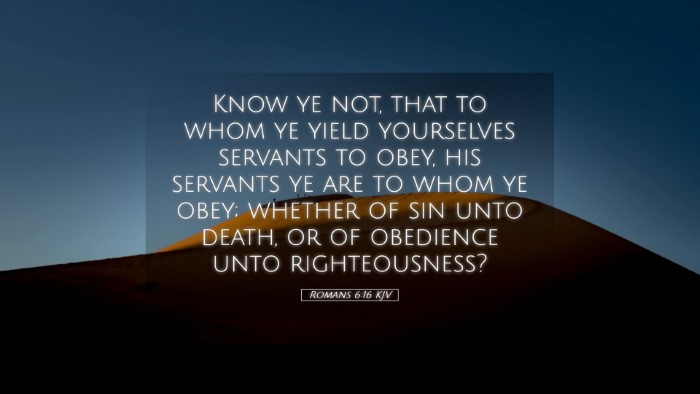Old Testament
Genesis Exodus Leviticus Numbers Deuteronomy Joshua Judges Ruth 1 Samuel 2 Samuel 1 Kings 2 Kings 1 Chronicles 2 Chronicles Ezra Nehemiah Esther Job Psalms Proverbs Ecclesiastes Song of Solomon Isaiah Jeremiah Lamentations Ezekiel Daniel Hosea Joel Amos Obadiah Jonah Micah Nahum Habakkuk Zephaniah Haggai Zechariah MalachiRomans 6:16
Romans 6:16 KJV
Know ye not, that to whom ye yield yourselves servants to obey, his servants ye are to whom ye obey; whether of sin unto death, or of obedience unto righteousness?
Romans 6:16 Bible Commentary
Commentary on Romans 6:16
Romans 6:16 states, "Do you not know that to whom you present yourselves slaves to obey, you are that one’s slaves whom you obey, whether of sin leading to death, or of obedience leading to righteousness?" This verse serves as a critical juncture in Paul's discourse on the implications of grace and sin in the life of a believer.
Exegesis of the Text
At the heart of this verse is the concept of servitude. Paul, using the metaphor of slavery, addresses the believer's relationship with sin and righteousness. Henry highlights that this is not a mere theoretical discussion; it has practical implications for believers who are called to recognize their identity and allegiance.
Understanding the Metaphor of Slavery
In the cultural context of Paul's audience, slavery was a common condition. Both Albert Barnes and Adam Clarke elucidate that the nature of one's servitude reveals profound truths about one's spiritual condition. Believers are urged to discern who they yield themselves to, as this defines their spiritual master.
- Spiritual Authority: The term 'master' indicates authority, revealing that spiritual allegiance determines destiny. Barnes emphasizes that obedience can lead either to sin and death or to righteousness that results in life.
- Choice of Allegiance: Paul stresses that the choice lies with the believer. They are neither passive participants nor devoid of agency; rather, they actively choose their allegiance. Clarke encourages reflection on the consequences of each choice: life through Christ or death through sin.
The Dual Nature of Obedience
The dichotomy presented by Paul—obedience to sin leading to death versus obedience to righteousness leading to life—underscores the profound importance of obedience. Matthew Henry comments on the implications of yielding to these two distinct masters.
- Obedience as a Present Master: This verse implies that whatever one chooses to obey becomes their master. A habitual yielding to sin erects a throne of death; conversely, yielding to Christ establishes a pathway to righteousness and eternal life.
- Result of Obedience: The notion of 'leading to death' or 'leading to righteousness' highlights the consequences of our choices. Paul elucidates that true freedom is found in servitude to Christ, while rebellion against God manifests in spiritual death.
Practical Applications for Believers
In reflecting on Romans 6:16, several applications arise for the modern believer:
- Self-Examination: Believers are called to examine their daily choices and the motivations behind their actions. This self-awareness can guide them to align their lives with God's will and righteousness.
- Intentional Discipleship: Understanding the nature of servitude to sin bolsters the call for discipleship, encouraging believers to pursue spiritual growth and righteousness intentionally.
- Community and Accountability: Engaging with fellow believers fosters accountability in the pursuit of righteousness. Paul emphasizes communal support, recognizing that we are stronger together in resisting sin.
Theological Implications
Theologically, Romans 6:16 challenges traditional views on free will and determinism. Paul asserts that although Christians have freedom in Christ, this freedom extends to the choice of whom to serve.
- Divine Sovereignty and Human Responsibility: The interplay between divine sovereignty and human choice is apparent in this verse. It affirms God's grace while admonishing believers of their responsibility in making conscious spiritual decisions.
- Sanctification Process: This verse also speaks to the process of sanctification, where believers are progressively transformed into the image of Christ through their obedience, as highlighted by commentators across the centuries.
Conclusion
Romans 6:16 is rich in meaning, calling believers to a sober understanding of their spiritual condition. The careful balance of warning against sin and the promise of righteousness encapsulates the journey of faith. Influential commentators remind us that our choices matter and the spiritual allegiance we contract will determine our ultimate destiny. By embracing our role as servants of righteousness, we not only glorify God but also fulfill our purpose as active participants in His divine plan.
As we conclude our reflection on this powerful verse, it is crucial for pastors, students, theologians, and scholars to delve deeper into how they, too, can encourage others to make choices that align with their covenant loyalty to Christ.


